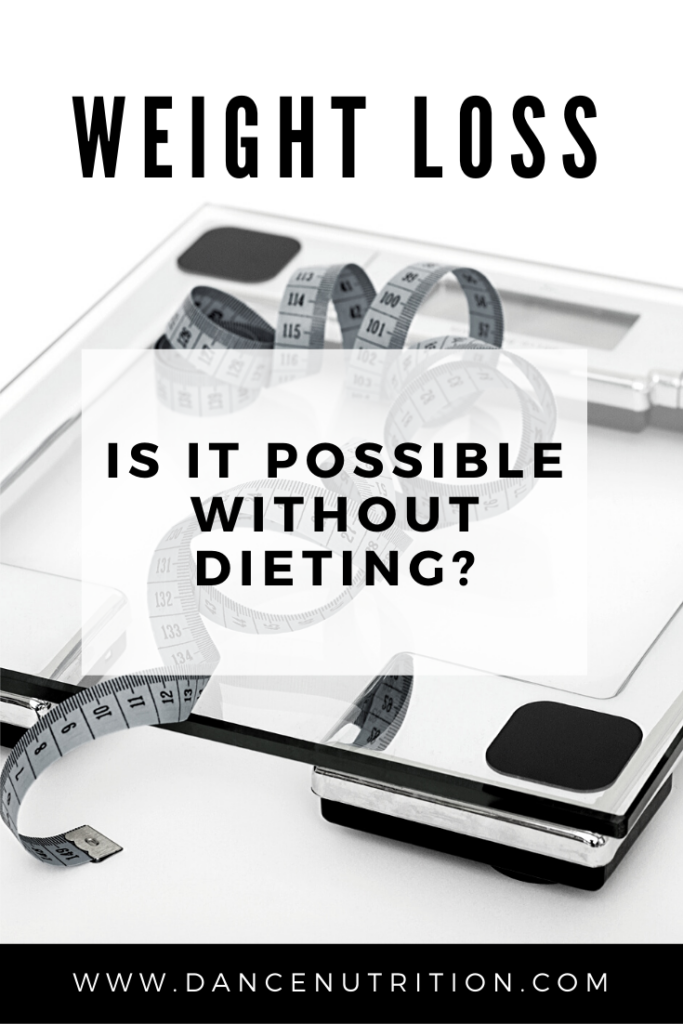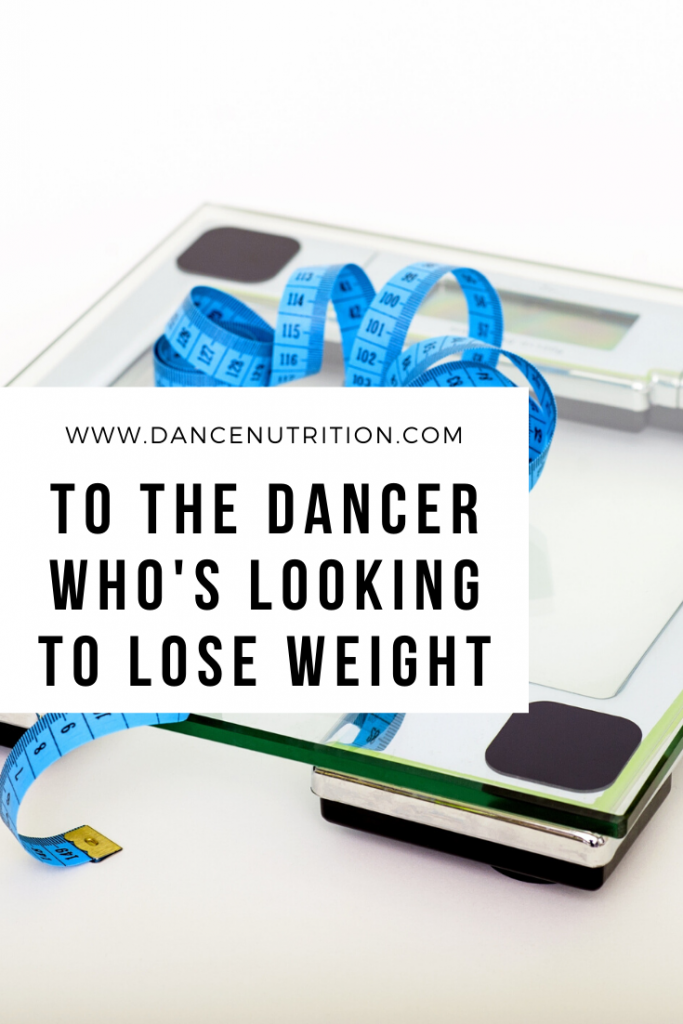A dancer’s desire to lose weight is the reality of an industry saturated with aesthetic ideals. Unfortunately, dancer diet culture has conditioned us to think that a specific body ideal is key to success— it’s understandable when a dancer comes to me wanting weight loss.
Simultaneously, the health and wellness world is evolving with powerful movements like intuitive eating and body acceptance. Much of my social media presence centers around my non-restrictive approach to eating. As a Registered Dietitian Nutritionist for dancers, I teach dancers how to engage in health-promoting behaviors— those that are sustainable and practical. The problem is that dieting rebranded. Wellness is now the guise with “lifestyle changes” often involving restrictive eating, food rules, & weight control.
So, does weight loss fit into a non-diet lifestyle?
But I want to lose weight healthfully!
Every dancer is entitled to body autonomy and for some, that involves the desire to lose weight. There is no shame nor judgment in that! Especially as someone with thin privilege, I would never invalidate this desire. But unless you’re well over 20, your body is likely gaining weight to support normal growth patterns. Weight loss can be detrimental to your growth and body maturity.
However, it’s my ethical duty to educate dancers about the hard facts of not only dieting but also, systemic fatphobia and weight stigma. This is especially true because we know that:
- Weight loss does not equate to better health.
- Long-term weight loss is impossible for 95-98% of dieters.
- Long-term “successful” dieters are often partaking in severely disordered eating habits.
- The negative health impacts of weight cycling outweigh any supposed benefits of extreme weight loss.
While weight loss is not a priority, it’s important to recognize that the desire to lose weight can coexist alongside body acceptance. The Healthy Dancer® uncovers the challenges and learns to embrace body changes— building confidence alongside them.
Can dancers lose weight and still maintain a non-diet lifestyle?
Despite the level of control you feel is needed to achieve your goal weight, your body will eventually do what it needs to do. Family, friends, artistic directors, teachers, and choreographers cannot dictate your body weight goals. Even you cannot dictate this goal and I, despite being a medical professional, certainly cannot dictate that goal. Rather, your body and its genetic blueprint, dictate this goal. We call this our set point weight.
What is my set point weight?
I’ve previously discussed how to define a healthy weight for dancers. Your set point is the weight range at which your body feels most comfortable. It’s like the “sweet spot!” Contrary to assumption, identifying your set point weight range involves focusing on your feelings and behaviors, NOT your weight! When you’re at your set point, you:
- Do not micromanage your weight.
- Maintain your weight within a range.
- Honor hunger and fullness cues in a way that feels good.
- Move your body in a way that doesn’t feel excessive or compulsive.
Can you help me lose weight?
I truly believe that we can reach a point of happiness within our bodies without having to sacrifice the very foods that we love. I also believe that dancers can be successful and have fulfilling careers without having to diet. However, I’m not going to guarantee you weight loss, and if anyone does guarantee you this, then I question the sustainability of that goal.
Now, despite weight loss not being a priority for The Healthy Dancer®, it could be a symptom as you build a supportive relationship with food. This is often the dancer who is now regulating their appetite and partaking less in compensatory eating (like binge eating or eating past the point of physical fullness). Contrary to popular belief, it’s likely this dancer is now eating more regularly throughout the day.
On the flip side, dancers may gain weight along their journey of becoming The Healthy Dancer®. This is often the dancer who is now eating more to make up for a past of severe calorie restriction— they’re now eating an adequate and consistent amount of food to meet their body’s metabolic needs. Given the commonality of restrained eating and low-calorie dieting among dancers, it’s common for weight gain to be a symptom of recovery.
And last, there’s also the dancer who maintains their weight whilst building more supportive eating routines. The bottom line? Weight changes are often unpredictable and will depend on the individual.
Can dancers strive for weight loss goals?
When dancers strive for weight loss as a primary goal, they risk unsupportive behaviors like restrictive eating and over-exercising. Even attempts to eat intuitively to lose weight turn an otherwise supportive idea into a very unsupportive diet. This leaves dancers tired, frustrated, dissatisfied, chronically hungry, constantly thinking about food, and likely to, eventually, eat past a point of physical comfort. In the long term? Burnt out and injured.
As mentioned, for some, weight loss is possible if restrained eating and low-calorie dieting cause binge-eating behaviors. But this won’t be predictable. Instead, we can work to equip you with a lifestyle that’s both sustainable and enjoyable. Your goal can focus on feeling strong, energized, and confident in both your body and in your food choices.
I’m not ready to give up my weight loss goal
This is understandable— especially for dancers who have experienced any past instance(s) of weight stigma, “fat talks,” or body shaming. There’s no doubt that even the mere possibility of weight gain comes alongside the radical acceptance of a body that most dancers fear will be either rejected at auditions or limited in performance potential.
I encourage you to challenge this discourse (here’s a starting point). As you begin to consider your weight goals and how they fit into a non-diet lifestyle, consider these prompts:
- What else might I gain from a non-diet lifestyle? Perhaps it’s experiences, ease at mealtimes, and energy to dance.
- What will I mourn or lose from a non-diet lifestyle? Perhaps it’s the control (though this is known to be fleeting).
- What support can I lean into when experiencing self-doubt? The Healthy Dancer® offers a tremendous amount of support for dancers wanting to build a supportive relationship with food.
There’s nothing wrong with having body goals as a dancer; it’s a topic I’ve covered at length here. Regarding weight changes, it’s a topic I’m asked about often and the reason why I created my advanced course Nourish The Healthy Dancer®: Cultivate Confidence. Remember: a healthy body weight supports the physical demands of dance while balancing the metabolic demands of growth. A dancer’s ideal body can be maintained without dieting or obsessive exercise routines that go beyond what’s needed for your dancing. To begin your journey towards cultivating confidence, learn more here.




